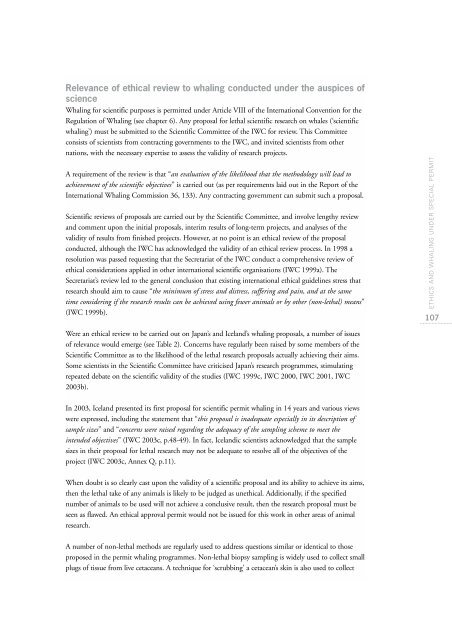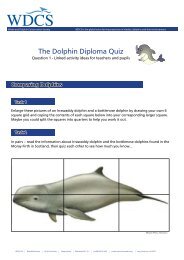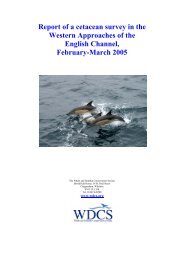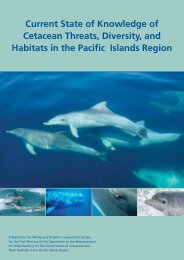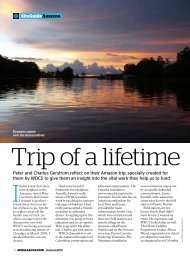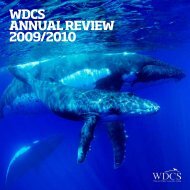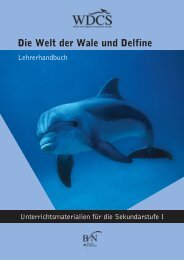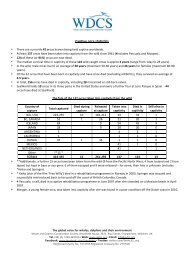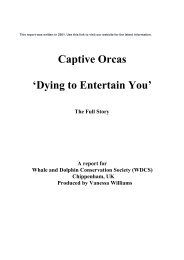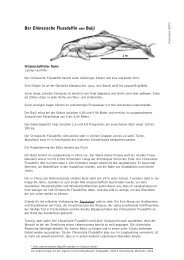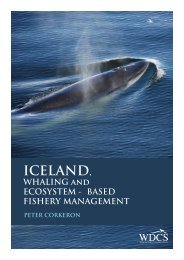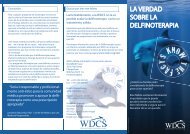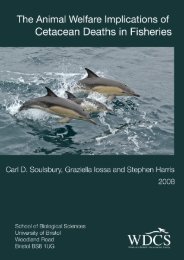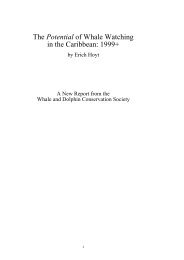TROUBLED WATERS - Whale and Dolphin Conservation Society
TROUBLED WATERS - Whale and Dolphin Conservation Society
TROUBLED WATERS - Whale and Dolphin Conservation Society
Create successful ePaper yourself
Turn your PDF publications into a flip-book with our unique Google optimized e-Paper software.
Relevance of ethical review to whaling conducted under the auspices of<br />
science<br />
Whaling for scientific purposes is permitted under Article VIII of the International Convention for the<br />
Regulation of Whaling (see chapter 6). Any proposal for lethal scientific research on whales (‘scientific<br />
whaling’) must be submitted to the Scientific Committee of the IWC for review. This Committee<br />
consists of scientists from contracting governments to the IWC, <strong>and</strong> invited scientists from other<br />
nations, with the necessary expertise to assess the validity of research projects.<br />
A requirement of the review is that “an evaluation of the likelihood that the methodology will lead to<br />
achievement of the scientific objectives” is carried out (as per requirements laid out in the Report of the<br />
International Whaling Commission 36, 133). Any contracting government can submit such a proposal.<br />
Scientific reviews of proposals are carried out by the Scientific Committee, <strong>and</strong> involve lengthy review<br />
<strong>and</strong> comment upon the initial proposals, interim results of long-term projects, <strong>and</strong> analyses of the<br />
validity of results from finished projects. However, at no point is an ethical review of the proposal<br />
conducted, although the IWC has acknowledged the validity of an ethical review process. In 1998 a<br />
resolution was passed requesting that the Secretariat of the IWC conduct a comprehensive review of<br />
ethical considerations applied in other international scientific organisations (IWC 1999a). The<br />
Secretariat’s review led to the general conclusion that existing international ethical guidelines stress that<br />
research should aim to cause “the minimum of stress <strong>and</strong> distress, suffering <strong>and</strong> pain, <strong>and</strong> at the same<br />
time considering if the research results can be achieved using fewer animals or by other (non-lethal) means”<br />
(IWC 1999b).<br />
Were an ethical review to be carried out on Japan’s <strong>and</strong> Icel<strong>and</strong>’s whaling proposals, a number of issues<br />
of relevance would emerge (see Table 2). Concerns have regularly been raised by some members of the<br />
Scientific Committee as to the likelihood of the lethal research proposals actually achieving their aims.<br />
Some scientists in the Scientific Committee have criticised Japan’s research programmes, stimulating<br />
repeated debate on the scientific validity of the studies (IWC 1999c, IWC 2000, IWC 2001, IWC<br />
2003b).<br />
In 2003, Icel<strong>and</strong> presented its first proposal for scientific permit whaling in 14 years <strong>and</strong> various views<br />
were expressed, including the statement that “this proposal is inadequate especially in its description of<br />
sample sizes” <strong>and</strong> “concerns were raised regarding the adequacy of the sampling scheme to meet the<br />
intended objectives” (IWC 2003c, p.48-49). In fact, Icel<strong>and</strong>ic scientists acknowledged that the sample<br />
sizes in their proposal for lethal research may not be adequate to resolve all of the objectives of the<br />
project (IWC 2003c, Annex Q, p.11).<br />
When doubt is so clearly cast upon the validity of a scientific proposal <strong>and</strong> its ability to achieve its aims,<br />
then the lethal take of any animals is likely to be judged as unethical. Additionally, if the specified<br />
number of animals to be used will not achieve a conclusive result, then the research proposal must be<br />
seen as flawed. An ethical approval permit would not be issued for this work in other areas of animal<br />
research.<br />
A number of non-lethal methods are regularly used to address questions similar or identical to those<br />
proposed in the permit whaling programmes. Non-lethal biopsy sampling is widely used to collect small<br />
plugs of tissue from live cetaceans. A technique for ‘scrubbing’ a cetacean’s skin is also used to collect<br />
ETHICS AND WHALING UNDER SPECIAL PERMIT<br />
107


